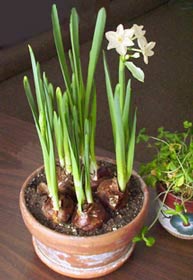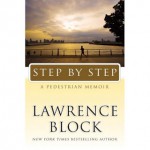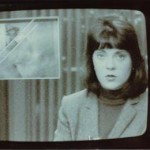 I had a writing lesson from the garden the other day. If you want to get technical, it wasn’t directly from the garden, but it was garden-related. I like to force bulbs at this time of year. I love having blooms in the middle of winter. This year I had a left over pre-packaged kit of paper whites. They were destined to be a Christmas gift, but at the last minute another gift was switched in and I decided to keep them.
I had a writing lesson from the garden the other day. If you want to get technical, it wasn’t directly from the garden, but it was garden-related. I like to force bulbs at this time of year. I love having blooms in the middle of winter. This year I had a left over pre-packaged kit of paper whites. They were destined to be a Christmas gift, but at the last minute another gift was switched in and I decided to keep them.
I set three bulbs into a regular garden pot and surrounded them with the premade soilless mix that came in the kit. That pot went on my kitchen windowsill. I nestled two other bulbs in a vase filled with colored stones and water. I put the vase in my living room on a cabinet across from the front door. I figured they’d be a great welcome home as they sprouted and bloomed.
The two bulbs in the living room showed signs of life within a few days. Tiny green sprouts shot out of the bulbs, sturdy and purposeful. The three bulbs in the kitchen languished. I made sure they had just enough (but not too much) water. I attempted to keep the temperature cool. I hovered for a bit and then turned a blind eye. One bulb eventually put out a tentative flicker of green and then stopped. I’d never had much luck with soilless mixes, I told myself. Forcing in water seemed more a sure thing for me.
After about a week, the shoots in the living room were up about a foot and flowers were starting to form. Frustrated with the lack of action in the kitchen, I moved the flower pot into the living room as well. Maybe a different setting will help, I thought as I set it on a cool windowsill. Sure enough, within two days the bulbs in the soilless mix were happily sprouting, racing to catch up with their watery siblings.
The whole experience reminded me of why setting is important in a novel. We sometimes forget about it, or think of setting as only an afterthought, but a good setting – actually the right setting – can make a book stronger. A poorly selected or negligible setting is a lost opportunity. I can’t remember who told me that setting is as important as your characters. I believe it. In fact, in some novels setting becomes as important as a character. Choose your setting wisely. Make that sense of place come alive. And watch your book bloom.













Comments